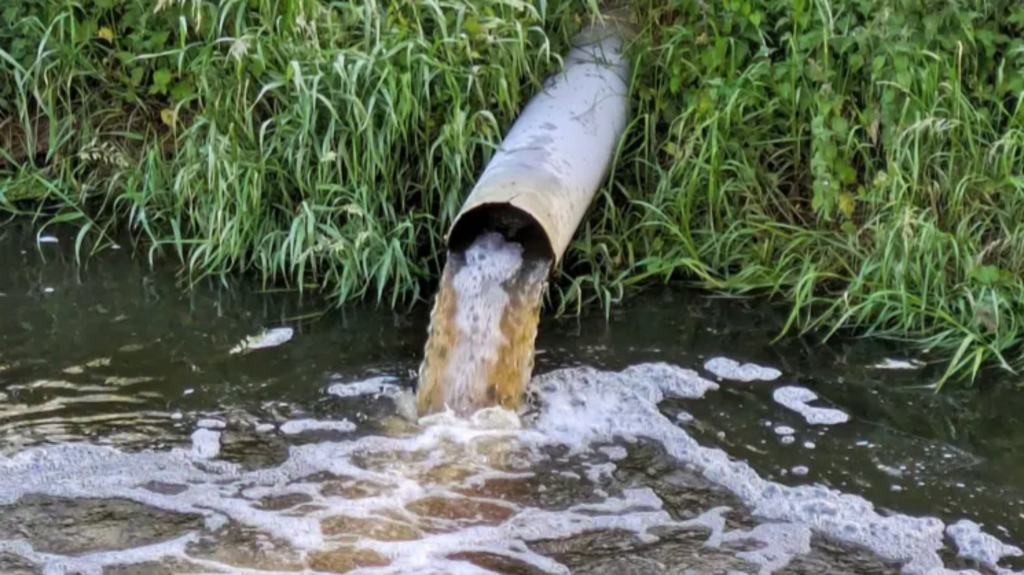The Environment Secretary has pledged to halve the number of sewage discharges by water companies by 2030.
Speaking on the BBC’s *Sunday with Laura Kuenssberg*, Steve Reed acknowledged public anger over the “broken” state of the water sector, stating that his performance should be judged at the next election based on improvements made.
Data released by the Environment Agency on Friday revealed a 60% increase in serious pollution incidents by water companies in England during 2024, reaching a record high.
This marks the first time the government has established a specific target for reducing pollution spills, following widespread public concern regarding the condition of UK waterways.
Reed stated he had spoken with people “up and down the country” who expressed outrage over the state of the nation’s water.
He told Laura Kuenssberg that he would be held accountable if water quality had not improved by the time of the next election.
“Politicians come and say we’re going to do things. Of course our job should be on the line if we don’t,” he asserted.
Water companies have faced intense scrutiny due to the increasing number of sewage discharges into UK waterways, coupled with rising consumer bills, while these same firms have distributed millions to executives and shareholders.
The Environment Agency reported 2,801 pollution incidents recorded by water companies in 2024, an increase from 2,174 in 2023.
Of these, 75 were classified as causing “serious or persistent” harm to fisheries, drinking water, and human health, up from 47 the previous year.
A significant review of the water industry by the Water Commission is expected on Monday, potentially including a recommendation to abolish the sector’s regulator, Ofwat.
Reed acknowledged that Ofwat was “clearly failing” and that “regulation must change,” but stopped short of confirming whether it would be dissolved.
The Environment Secretary also mentioned receiving the commission’s report but indicated that he had not yet had sufficient time to thoroughly review it.
While the number of discharges increased last year, government figures show water company bosses in England received £7.6m in bonuses. In June, bonus payouts were prohibited at six firms that had failed to meet environmental and consumer standards.
Reed described the additional £691,000 awarded to the CEO of Southern Water, nearly doubling his income, as “outrageous.”
He urged Southern Water’s CEO to “think how this looks to their customers” and decline the pay rise.
However, Reed ruled out nationalizing water companies, arguing that it would “take years” and be prohibitively expensive.
“Nationalisation would cost upwards of £100bn that we’d have to take away from the NHS and schools to give to the owners of the companies that are polluting.”
Victoria Atkins, Conservative MP and shadow secretary of state for environment, food and rural affairs, conceded that “more should have been done when we were in government.”
However, she argued that Labour needed to provide more clarity on who would finance the necessary new investment in the sector.
James Wallace, chief executive of River Action UK, described the target as “admirable” but ultimately a “political pledge” rather than a legally binding commitment.
Reed’s pledge is part of broader government plans to improve the water sector, including a commitment to collaborate with devolved governments across the UK to ban wet wipes containing plastic, among other measures.
A record £104bn is slated for investment in the water sector over the next five years to upgrade its infrastructure.
As a result, consumer bills are projected to increase by an average of £123 annually – although for Southern Water customers, this could be as high as £224.
The Environment Agency has also received £189m to support hundreds of enforcement officers in inspecting and prosecuting water companies, with fines retroactively funding these activities.
England operates a combined sewage system, processing both rainfall and sewage through the same infrastructure. Increased rainfall levels last year may have overwhelmed some aging water company infrastructure.
However, despite rainfall variations, discharges resulting in serious pollution constitute a breach of companies’ permits and legal obligations.
While many incidents are reported to the Environment Agency by the companies themselves, nearly a quarter of sites were found to be in breach of their permits during 4,000 inspections conducted by the regulator last year.
Nigel Farage, leader of Reform UK, characterized the water industry as a “hell of a mess” and advocated for joint public-private ownership.
He stated that the state needed to regain “some degree of control over vital national assets” but did not provide a cost estimate.
Liberal Democrat leader Ed Davey argued for replacing Ofwat and suggested that public benefit corporations should replace private companies in managing the UK’s water infrastructure.
The world’s race to decarbonise has led to the rise of electric cars – and with it, soaring demand for lithium, which is required for the batteries
Don’t underestimate the importance of nature for tackling poor mental health, says Natural England.
Wasps are having a good year following a cooler summer in 2024 – so how can we live alongside them without a sting?
Natural Resources Wales data shows Welsh Water was responsible for 132 sewage spills in 2024.
The firm saw four serious incidents in 2024 and the highest number of incidents per 10,000km of sewer.

